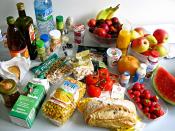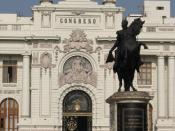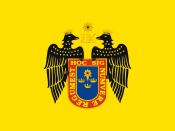It is like entering another dimension. Two places that are so geographically close yet so economically different. Here in Delta, our lives are filled with lavish luxuries compared to the lives of the children in the slums of Lima, Peru. For the children in Peru, eating is a blessing, and healthcare is a luxury they can only dream of. However, their substandard lives are worth living for simpler reasons than ours are.
The daily food intake of a Peruvian child is less than a quarter of the Canadian Food Guide. Even if they do eat this small amount, they are extremely underweight and malnourished. Their diet may consist of a bowl of soup but only if they are lucky enough to get to a homeless kitchen. Otherwise, all they have is whatever they can find on the streets or leftovers from restaurants and people's lunches. Much of this food is infested with disease and bacteria that cause health problems they cannot afford.
The strong belong to gangs. They join these gangs from ages early as 12 and remain there for long periods of time. Gangs find a victim and steal anything they have. These things are only possibilities. Most of the time the food they get is credited only to pure luck. Here, the food is abundant. Homeless shelters and food banks are everywhere because the support of others in our community. Aside from the amount of food they receive, it is the type of food. Cheap diets include guinie pigs, corn, and onions. Where we live, guinie pigs are considered a domestic pet. Our diets are so varied that we rarely eat the same meal twice in one weak. The food here is carefully inspected for bacteria and laws are inforced on how to cook it.
In Delta, we are an hour and a half or less away from eight hospitals, over fifteen clinics and countless family doctors. In the slums of Peru there is not an established hospital but only a poor clinic or two to serve the millions of unofficial citizens. Aside from the scarce numbers of clinics, they are expected to pay for treatment they receive. After wading through all of the sick in the waiting room, there is much to be desired. The medicine is inadequate and the equipment outdated. Canadians receive medical care with the latest technology available. They receive care and assistance from the government whenever they are in need. Also, there is less disease causing elements in Canada. The food and environment in Peru is tainted with infectious parasites that lead to untreatable illnesses and possibly unnecessary death. In Peru, they only go to seek medical help when they are sure they are sick. By the time they realize they are sick, it is often too late. Here, we can go for a checkup with the slightest inclination of poor health.
Although they live in poverty and hunger, the children of Lima, Peru learn values that are taken for granted here. They have appreciation for anything above nothing. Here, with a roof over our heads, running water, and electricity we feel that we are deprived of something most of the time. It could be a car for our sixteenth birthday or a trendy piece of clothing. These children also seem to look to their family for help in growing up, while here, the youth seems to rebel against any form of authority. These kids know that all they have is their family and they are grateful for that. Also, these people live without things we think of as necessities. Examples of these necessities would be indoor heating systems, buses, cars, and new clothes. All of these things make their lives worth living because they know they are on this earth for a reason and they live their lives the best they can.
We are aware that actions have to be taken to assist people in third world countries, yet how much effort are we really putting in? Starting with our own homes, we need to stop taking our lives for granted. Examples of this would be our abundance in food, government funded health care, and how well off we are compared to the children of Lima, Peru. The well being of third world countries depends on the aid industrialized countries provide it.





